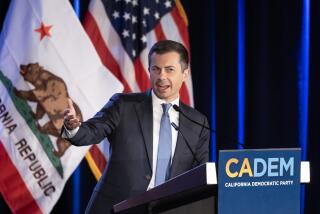Cardinal Dolan stirs things up with planned GOP appearance
Prayer has long had a place at national political conventions. Both parties have called on prominent pastors, priests and other religious figures to deliver convocations, benedictions and other words of spiritual uplift.
So why the uproar over Cardinal Timothy Dolan of New York offering a benediction at the Republican National Convention?
Ever since the announcement this week of Dolan’s role at the convention, the blogosphere -- especially the Roman Catholic blogosphere -- has hummed with reaction, positive and negative.
Conservatives, such as blogger Thomas Peters, writing at CatholicVote.org, were delighted. “I now predict that if Mitt Romney wins the White Housein 2012 there will be a very healthy relationship between a Romney administration and the U.S. Bishops, led by a close working relationship between Cardinal Dolan and President Romney,” he wrote Thursday.
But more liberal Catholics expressed dismay, suggesting that Dolan appeared to be taking sides in a partisan battle. “Dolan is playing an old game, but an increasingly dangerous one, as well,” wrote the National Catholic Reporter in an editorial Friday. “In accepting the invitation to this year’s Republican convention, where religion has been elevated to a major supporting role, Dolan is dragging the church and its invaluable swing voters into the midst of the fray, simultaneously allowing religion to be used as a tool of division.”
The controversy prompted Dolan’s spokesman, Joseph Zwilling, to issue a statement insisting that the cardinal meant nothing political by the gesture.
“It was made clear to the convention organizers ... that the Cardinal was coming only to pray not to endorse,” Zwilling said in a statement issued by the archdiocese of New York, “and that he would be willing to accept a similar offer from the Democratic Party as well.”
There was no similar outcry when Cardinal Roger Mahonyof Los Angeles agreed to deliver an invocation for the opening of the Democratic National Conventionin Los Angeles, nor have there been major debates over the appearances of most religious figures at conventions.
Dolan, however, may be a special case. He is, to begin with, not merely the archbishop of New York, the second-largest Catholic archdiocese in the country (next to Los Angeles). He is also head of the U.S. Conference of Catholic Bishopsand by far the most prominent Catholic prelate in the country. (Mahony, by contrast, was archbishop of the host city.)
Dolan also is no fan of President Obama’s, and has been at the forefront of Catholic opposition to rules promulgated by Obama’s Department of Health and Human Services that will require some religious institutions -- including Catholic schools and hospitals -- to provide free contraceptive services to their employees. Dolan sued the administration over the rule, and has generally played hardball in his rhetoric about Obama. In an interview with the Associated Press earlier this year, the cardinal said he wanted to take Obama at his word when the president said he would work with religious institutions to fine-tune the mandate, but “I do have to say it’s getting harder and harder.”
Then there’s the political context: Catholics comprise one of the most important swing votes in American politics. Whoever wins the Catholic vote usually wins the presidency. Four years ago, a majority of Catholics voted for Obama. In a recent Gallup poll, conducted July 30-Aug. 19, Romney had a 4-percentage-point lead over Obama among Catholics.
Furthermore, the race pits two Catholic candidates, albeit at the bottom of the tickets: Vice President Joe Biden and Rep. Paul D. Ryan. The two could hardly be more different, reflecting two extreme poles of American Catholicism -- one (Biden) stressing church teachings on social justice but breaking with the church on abortion laws, the other (Ryan) stressing his opposition to abortion but incurring the church’s dismay over budget plans deemed harmful to the social welfare.
As things stand now, just one of them will enter the formal stage of the general election campaign with the blessing of the country’s most powerful Catholic bishop under his belt.
Follow Politics Now on Twitter
Twitter: @latlands
More to Read
Get the L.A. Times Politics newsletter
Deeply reported insights into legislation, politics and policy from Sacramento, Washington and beyond. In your inbox three times per week.
You may occasionally receive promotional content from the Los Angeles Times.










